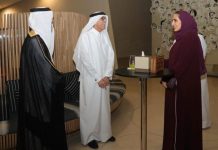MOSCOW: Russian President Vladimir Putin has reaffirmed support for Lebanon’s sovereignty in a phone call with the country’s Prime Minister-designate Saad Hariri, the Kremlin press service said in a statement on Thursday.
“Saad Hariri briefed [Vladimir Putin] on the domestic political situation in Lebanon and efforts to form a new government and overcome the current economic crisis,” the statement reads. “Russia reaffirmed its principled position to support Lebanon’s sovereignty, independence, unity and territorial integrity,” the Kremlin press service added.
“The parties discussed bilateral cooperation with a focus on ways to boost trade and economic relations and enhance ties between the relevant agencies in the fight against the coronavirus pandemic, including the supply of Russian vaccines,” the statement added.
The two leaders also exchanged views on pressing regional issues, expressing willingness to cooperate in the creation of conditions for the safe return of Syrian refugees sheltered in Lebanon to their home country. “The Russian president wished a happy Ramadan to Saad Hariri and all Lebanese Muslims,” the Kremlin press service noted.
Lebanon’s Health Ministry approved the emergency use of Russia’s Sputnik V coronavirus vaccine on February 5. Twenty private firms were later granted the right to hold talks with pharmaceutical companies producing coronavirus medications. The first batch of the vaccine was delivered to Beirut from the United Arab Emirates on March 25.
Meanwhile on Thursday, a senior U.S. official warned that Lebanese politicians who continue to block reforms in the crisis-hit country could face punitive actions by Washington and its allies. U.S. undersecretary of state for political affairs David Hale did not provide details on the nature of the potential actions. But appeared to refer to reports that the United States and its allies may impose sanctions on Lebanese politicians in order to force them to end a monthslong political deadlock and start badly needed reforms to fight corruption.
Political bickering has delayed the formation of a new Cabinet as the country sinks deeper into its worst economic and financial crisis in its modern history. The economic crisis is the gravest threat to Lebanon’s stability since the 15-year civil war ended in 1990.
The outgoing government resigned last August, following a massive explosion at Beirut’s port that killed 211 people, injured more than 6,000 and damaged entire neighborhoods in the capital.
Prime Minister-designate Saad Hariri has failed to form a new government since he was named for the post in October. – Agencies




